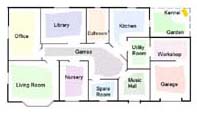
|
|||
|
|||

|
|||
|
|||
NEW GAMES AND VARIATIONS ON SOME OLD ONES Next time you are out for the day, try the following - Frisbee Golf - it is essential the play area is suitable for this kind of game. Do not attempt to play in a populated area where accidents can occur. Select trees, posts, rocks etc. as "holes" and mark tee-off spots. Throw a frisbee and keep throwing it from where it lands until you land at the hole. As in golf, the person reaching the final hole in fewest throws is the winner. A penalty point can be given if the frisbee lands in a position from which it cannot be thrown. Badminton Volleyball - Play badminton over a volleyball net using volleyball rules. Variation of Noughts and Crosses - draw 19 horizontal and 19 vertical lines into a grid. One player places 'Xs' the other 'Os' on the intersection of the lines. The first player to place 5 letters in a row is the winner. Anagrams - a word game for two to eight players. If you do not have a set of anagram tiles (and who does) you can either use two sets of Scrabble tiles or make your own by cutting cards into 1" squares and print a letter on one side of each piece. There needs to be several cards for each letter based on the number of times the particular letter is used in the language. You can use the numbers given in the Scrabble set (x2) of course. Place the tiles face down on the table, going around the table, each player turns over one tile and placed it in the centre. Players have to spot one word of at least four letters from among the tiles that have been turned over. Any player spotting a word calls it out (irrespective of whether it is their go or not) and places the word in question in front of themselves. You can capture a word from another player by adding a letter from the centre to make a different word. The first player assembling ten words wins. If all the tiles have been turned over before anyone reaches ten words, the player with the most words is the winner. Jacks Although you can now buy special sets of jacks, this game was traditionally played with stones. Traditional (1) - Select five small stones throw four onto a flat surface, then using the same hand all the time, throw one into the air, pick up one off the ground and catch the stone before it drops. This is repeated for all four stones. Then pick up two of the four stones together, before the stone drops etc. This is of course harder than the modern version as the stone cannot bounce before catching, so you have to be a lot quicker. Traditional (2) The player takes all five Jacks in the palm of his hand and throws them up in the air, catches them on the BACK of his/her hand and then tosses them from the back of the hand and catches them in the palm. If he/she fails to catch any, the player is out. If more than one is caught, all but one is put on the ground, the remaining one is thrown in the air, a Jack is retrieved from the ground and then the jack is caught using the same hand at all times. Continue in this way until all the Jacks on the ground have been picked up. If at any time the throwing Jack is dropped, the player is out. The game continues by retrieving two Jacks at a time, then three, four etc. Under the Arch All Jacks are scattered on the ground. The player makes an arch with the thumb and forefinger of the non throwing hand near the group of Jacks. He chooses one, throws it in the air and before catching it again, knocks one of the Jacks on the ground through the arch. This is repeated until all Jacks have been pushed through the arch. The arch is then removed, the fifth Jack is thrown in the air once more and all four Jacks are retrieved before catching it. The game continues by pushing two, three then four Jacks through the arch at one time. Modern - all ten jacks are thrown onto a flat surface. Using one hand only throw the ball into the air and pick up one jack catching the ball in the same hand after it has bounced. Repeat this until all ten jacks have been retrieved. Repeat this picking up two jacks each time the ball is thrown and so on, threes (3 x 3 +1), fours (4 x 2+2), fives (5 x 2), sixes (6 + 4), sevens (7 + 3), eights (8 + 2), nines (9 + 1) and ten. You lose your turn if you fail to pick up all the required jacks, if you fail to catch the ball after one bounce or if you have touched any jack other than the ones you were trying to pick up. When your turn comes again start at the stage at which you last played. The first player to complete all ten stages is the winner.
Copyright © 2000-2020 Hints and Things cannot be held responsible for any information given on this site nor do they necessarily agree with, or endorse, the views given by third parties. |